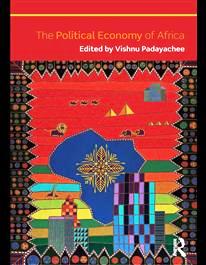
The Humanities and Commerce Faculties hosted distinguished academics and speakers Mr Nicolas Pons-Vignon and Prof Bill Freund last week as part of the Political Economy of Africa seminar. Mr Pons-Vignon and Prof Freund addressed students and lecturers on research conducted into the economic history of Africa and notions of afro-pessimism as discussed in their recent book, The Political Economy of Africa.
Prof Freund, visiting Senior Research Fellow with the Corporate Strategy and Industrial Development (CSID) research programme at the University of the Witwatersrand, senior professor emeritus of Economic History at the University of KwaZulu-Natal and former head of the Department of Economic History and Development Studies at the University of KwaZulu-Natal, discussed the economic history of Africa under the title of his contribution to the book, “Wither afro-pessimism?”?
In considering the origins of the current economic system on the continent, Prof Freund highlighted the ways development is conceived of in Africa and how a negative image of the continent has been formed over recent decades. “Sure there are some disaster areas in Africa which tend to give it a bad name internationally, but there are also examples like Nairobi, Dakar and Dar es Salaam, all of which have lots of money and are being restructured,” he said. Although an overview of the economic history of Africa may seem dire, Prof Freund highlighted the need for a more nuanced view. “There are reasons for which one can understand the afro-pessimism view from a European perspective but it is actually inadequate in view of the complex dynamism of the place,” he said.
Mr Pons-Vignon, Senior Research Fellow with the CSID research programme and former doctoral researcher at the French Institute of South Africa tackled the issue of economic policy and suggested that the main reason for a lack of effective implementation was due to a lack of local expertise. “If policy efforts aren’t met with local knowledge and we keep going outside of Africa for dominant forms of knowledge it is very unlikely that this will lead to the type of development we would all like to see here,” he said.
He spoke of the need to formulate African economic policy in light of the issues and realities unique to Africa. “For the most part African economic policy has been shaped by outside thinkers, who have their own agendas. In many cases these are economic agendas which mean we get stuck with policies that don’t actually work here,” he said.
The Political Economy of Africa addresses the possibilities for African development in the coming decades when seen in the light of the continent's economic performance over the last half-century. As Prof Freund explained, this involves an effort to “emancipate our thinking from the grip of western economic models” that have often ignored Africa's diversity in light of a simpler “one-size-fits-all model”. “Despite what is often thought and written about Africa, this is not a stagnant space stuck in an afro-pessimism swamp. It has a lot of potential but it requires more thought and understanding on an economic level,” he said.
In addressing the seemingly intractable economic problems of the African continent, the book traces their origins, and as highlighted by Mr Pons-Vignon, it really is no wonder that Africa has mismatched and somewhat ineffective economic policies. “You cannot have western economic ideals being haphazardly applied to Africa. The biggest problem is that we don’t have enough African economists and critical thinkers that can address the issues here in a uniquely African way,” he said. He added that this was not necessarily “an accident”. “Economic and political imperatives of outsiders have superseded the need for developing local expertise. In some instances it was as crude as training Africans overseas only for them to return home to find they were totally out of touch with what was happening on the ground. It is unacceptable,” he said.
However, Prof Freund and Mr Pons-Vignon highlighted the potential of Africa, and touched on the possibilities for economic revival and renewal. “It is crucial for us to develop our own theoretical independence and to create policies that are effective here. We need to be funded by African funders who understand the dynamics here, and create new types of economics degrees that are more in line with the way things happen in Africa,” said Mr Pons-Vignon.
The book also explores issues such as employment and poverty, social policy and security, structural adjustment programmes and neo-liberal globalisation, majority rule and democratisation and taxation and resource mobilisation. It contains a selection of country-specific case studies from a range of international contributors, many of whom have lived and worked in Africa.
Prof Freund is the author of The Making of Contemporary Africa, The African Worker and, most recently, The African City: A History. He has written many articles and book chapters on political economy and development issues in South Africa.
Mr Pons-Vignon’s research focuses on industrial development and policy in South Africa, as well as on labour, poverty and aid. He is the founder and course director of the annual African Programme for Rethinking Development Economics (APORDE; www.aporde.org.za) and is completing a PhD on labour casualisation in the forestry sector in South Africa at the Ecole des Hautes Etudes en Sciences Sociales in Paris. He is also the editor of the Global Labour Column (global-labour-university.org ) and of the forthcoming book Don't waste the crisis. Labour responses to the failures of neo-liberalism.

